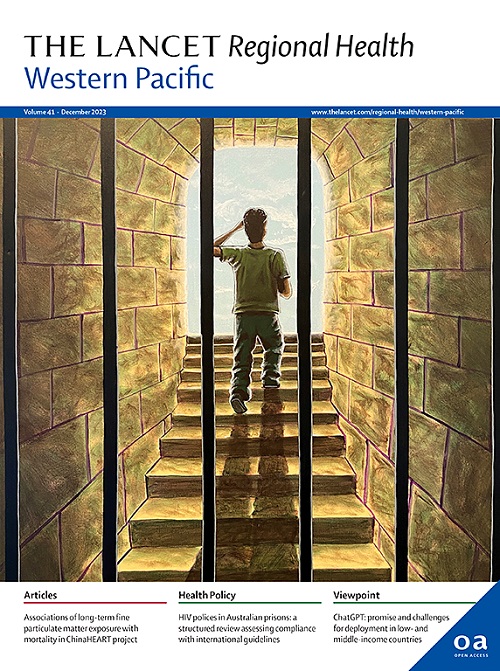Evolving role of the internet in China as a medium for promoting psychological well-being and mental health: a scoping review
IF 7.6
1区 医学
Q1 HEALTH CARE SCIENCES & SERVICES
引用次数: 0
Abstract
The rapid development of China's 5G ‘Internet Plus’ industry has led to increasing use of the Internet to provide healthcare services. Internet-based services in China are already widely used to prevent, identify, monitor, and manage mental disorders, but few of these services have been formally evaluated. To provide a clear baseline of this rapidly evolving field, we searched articles published before December 31, 2022, about internet-based interventions and surveys for mental health-related conditions in China in five international databases (Web of Science, PubMed, PsycINFO, Embase, and Cochrane Library) and four Chinese databases (CNKI, SinoMed, VIP, and WanFang). The 143 identified studies—54 in Chinese and 89 in English—described internet-based interventions and surveys in individuals with mental disorders, community residents, college students, older adults, pregnant women, and health professionals. The number of identified studies, which were mainly conducted in economically developed regions of the country, quadrupled after the 2019 onset of the COVID-19 pandemic. Available studies suggest—but do not prove—that internet-based interventions can reduce the severity of psychiatric symptoms, decrease healthcare costs, and improve the quality of life for individuals with mental disorders. Innovative smartphone applications could potentially improve the quality and expand the scope of internet-based interventions, making them a key component in ongoing efforts to prevent and monitor mental illness, enhance the self-management of mental disorders, and alleviate psychological distress among adolescents and other at-risk populations. However, achieving this long-term goal will require establishing standardised methods of administering internet-based interventions, training mental health professionals to implement and monitor the interventions, identifying methods of maintaining the confidentiality of collected information, and rigorously assessing the effectiveness of the interventions based on periodic assessment of uniform outcome measures. Clinical and policy research about expanding internet-based mental health interventions should focus on confidentiality, efficacy, and cost-effectiveness.
中国互联网作为促进心理健康和精神健康的媒介的演变作用:范围审查
随着中国5G“互联网+”产业的快速发展,越来越多的人利用互联网提供医疗服务。在中国,基于互联网的服务已经广泛用于预防、识别、监测和管理精神障碍,但这些服务很少得到正式评估。为了给这一快速发展的领域提供一个清晰的基线,我们在五个国际数据库(Web of Science、PubMed、PsycINFO、Embase和Cochrane Library)和四个中国数据库(CNKI、SinoMed、VIP和万方)中检索了2022年12月31日之前发表的关于基于互联网的中国心理健康状况干预和调查的文章。这143项确定的研究——54项中文研究和89项英文研究——描述了基于互联网的干预和调查,对象包括精神障碍患者、社区居民、大学生、老年人、孕妇和卫生专业人员。在2019年COVID-19大流行爆发后,已确定的研究数量(主要在该国经济发达地区进行)翻了两番。现有的研究表明——但没有证明——基于互联网的干预可以减轻精神症状的严重程度,降低医疗保健费用,并改善精神障碍患者的生活质量。创新的智能手机应用程序有可能提高基于互联网的干预措施的质量并扩大其范围,使其成为预防和监测精神疾病、加强精神障碍自我管理以及减轻青少年和其他高危人群心理困扰的持续努力的关键组成部分。然而,要实现这一长期目标,将需要建立管理基于互联网的干预措施的标准化方法,培训精神卫生专业人员实施和监测干预措施,确定为所收集信息保密的方法,并根据对统一结果措施的定期评估严格评估干预措施的有效性。关于扩大基于互联网的精神卫生干预措施的临床和政策研究应侧重于保密性、有效性和成本效益。
本文章由计算机程序翻译,如有差异,请以英文原文为准。
求助全文
约1分钟内获得全文
求助全文
来源期刊

The Lancet Regional Health: Western Pacific
Medicine-Pediatrics, Perinatology and Child Health
CiteScore
8.80
自引率
2.80%
发文量
305
审稿时长
11 weeks
期刊介绍:
The Lancet Regional Health – Western Pacific, a gold open access journal, is an integral part of The Lancet's global initiative advocating for healthcare quality and access worldwide. It aims to advance clinical practice and health policy in the Western Pacific region, contributing to enhanced health outcomes. The journal publishes high-quality original research shedding light on clinical practice and health policy in the region. It also includes reviews, commentaries, and opinion pieces covering diverse regional health topics, such as infectious diseases, non-communicable diseases, child and adolescent health, maternal and reproductive health, aging health, mental health, the health workforce and systems, and health policy.
 求助内容:
求助内容: 应助结果提醒方式:
应助结果提醒方式:


